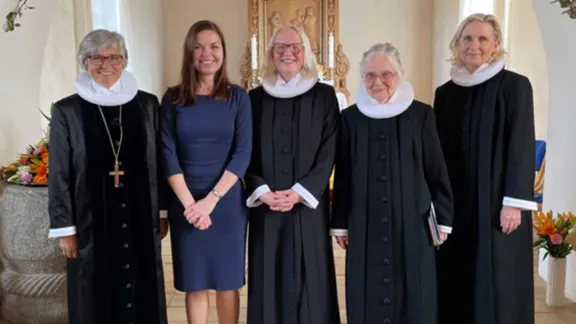In 1948, the first three women were ordained in the Evangelical Lutheran Church in Denmark. 75 years later, the church celebrates women’s contribution to the ordained ministry.

Celebrating 75 years of women in the ordained ministry: (from left) Bishop Marianne Gaarden, Denmark’s Minister for Church Affairs Louise Elholm Schack, hospital chaplain and member of the anniversary committee Birthe Friis, Pastor Emeritus Jette Walther Birk and Provost Anne Birgitte Reiter. Photo: Marlene Laursen
75 years of women in the ordained ministry
(LWI) - Johanne Andersen, Ruth Vermehren and Edith Brenneche Petersen were the first women to be ordained as pastors of the Evangelical Lutheran Church in Denmark in 1948. At the end of April, the church marked the 75th anniversary of that milestone with a festive service in Nørre Ørslev Church in Falster.
On this occasion, Marianne Gaarden, bishop of the Lolland-Falster Diocese, preached about the same Bible text as her predecessor Bishop Hans Øllgaard on 28 April 1948, namely Jesus’ resurrection in Matthew 28.
In ancient Biblical times, women were “not considered credible witnesses,” Gaarden said. Thus, the first women testifying of the resurrection “must have had incredible courage to speak and testify of their unbelievable experiences.”
Where did women get the courage to go against norms and conventions in the society of the time? - The short answer is: from God Himself!
Marianne GAARDEN, bishop of the Lolland-Falster diocese, Denmark
“Where did women get the courage to go against norms and conventions in the society of the time?” Gaarden asked. “The short answer is from God Himself! Jesus commanded the women to speak: ‘Go and tell my brethren to go to Galilee. There they shall see me.’ Despite the socially inferior status of women, Jesus chooses to place the first testimony of His resurrection in the mouths of women, and they take it upon themselves and follow the command they have been given. So, the courage to speak is given to them along with the task set by the Lord Himself. They were given a commandment.”
A long way to full inclusion of women in the ordained ministry
Looking back at developments in the past decades, it was not without controversy that the Danish church introduced women’s ordination. Initially, many church leaders opposed the idea, even threatening to lay down their office. Yet, the Diocese of Lolland-Falster took the initiative, expressing their wish to hire theologian Johanne Andersen as a pastor. That had required changes to government law and the church constitution. The amendment no longer referred to “men” but to “persons”, paving the way for the ordination of women as pastors.
Some bishops still opposed women’s ordination despite the new constitution. In March 1947, an amendment was passed, allowing bishops to exempt themselves from ordaining women. Nevertheless, Bishop Hans Øllgaard ordained the first three female pastors in Denmark on 28 April 1948 in the packed Odense Cathedral.
That was the start of fully including women in the ordained ministry in the Evangelical Lutheran Church in Denmark. Still, the road was long: It took until the 1970ies for significant numbers of women to enter the ordained ministry, also in light of societal developments of the time. In 1995, Liselotte Rebel became the first female bishop in Denmark, and just one month later, Sofie Petersen was installed as the first female bishop in Greenland. Only in 2010, the break-even point was reached with equal numbers of men and women being ordained pastors.
The 75th anniversary year is an opportunity to celebrate the progress made and reflect on the work that still needs to be done. “The achievements of the past 75 years give hope for a more inclusive and equitable future for the church and society,” the church stated.


